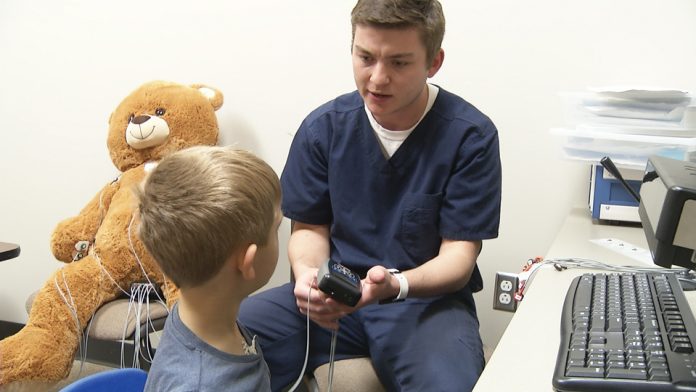
OU Allied Health researcher aims to improve diagnosis and treatment
Could a child’s response to happy, sad, mad or expressionless faces provide important answers about why stuttering happens and how to better treat it? One researcher at the University of Oklahoma College of Allied Health believes it may.
Katerina Ntourou, Ph.D., CCC-SLP, and her team utilize special sensors and computers in their new communications lab at the OU College of Allied Health to evaluate the genesis, manifestation and treatment of stuttering. Most importantly, though, they hope to shatter the myths that surround this common communications disorder.
“People think you stutter because you’re nervous. No. Or people who stutter have lower intelligence…absolutely not,” said Ntourou.
Stuttering impacts one in every 20 young people. The disorder is four times more common in boys than girls. While some outgrow it, others do not. In fact, one in every 100 people who stutter will continue to stutter long-term without treatment. Ntrourou aims to gain new insights that will lead to new, more effective treatments while also enhancing understanding of the disorder.
“Now, I’ve got to put two on your back,” said Landon McGee, a research assistant in the lab tells a young boy as sensors are applied to his chest and arms. In their lab, Ntourou and her team record a child’s silent physical responses to faces showing varied emotions.
“So if you have two pictures on the screen, one happy face and scary face or mad or sad, how quickly will the child look at that face and how long will their attention be drawn to that picture. Children who stutter even at a very young age seem to be more reactive and regulate less,” Ntrourou explained. Dr Ntoruou hopes her research will help develop more effective assessments for stuttering and better treatments so that children who stutter will learn to not only speak more fluently, but to grow up more confidently. “I would like parents and kids to have a safe place where they can talk about their struggles and their triumphs,” she said.
Ntrourou added that she is excited to work at the college, a place where care, research and treatment go hand in hand. The ultimate goal is to give families a way to navigate their own treatment while also building a solid foundation of research to help future families.











